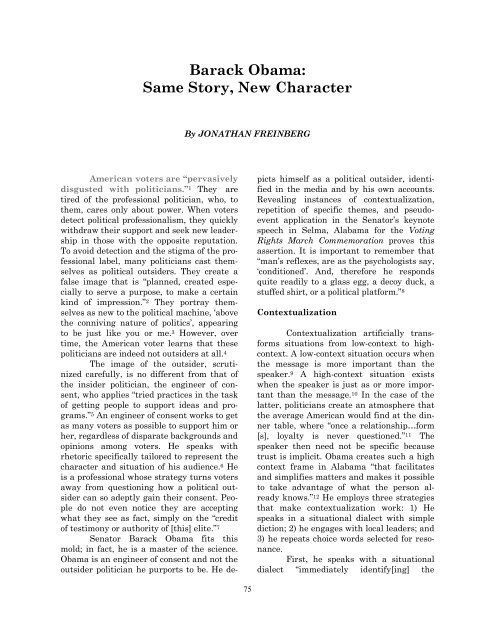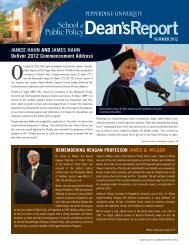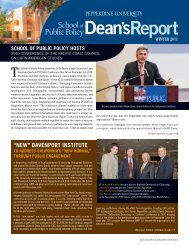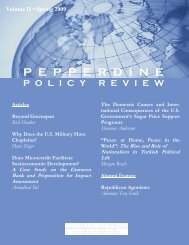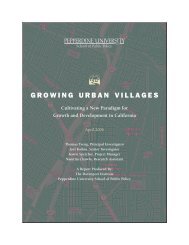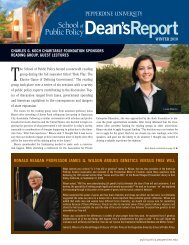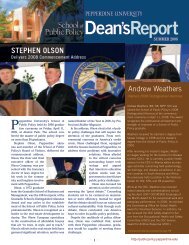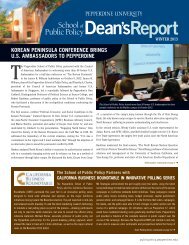Pepperdine University School of Public Policy
Pepperdine University School of Public Policy
Pepperdine University School of Public Policy
You also want an ePaper? Increase the reach of your titles
YUMPU automatically turns print PDFs into web optimized ePapers that Google loves.
Barack Obama:<br />
Same Story, New Character<br />
By JONATHAN FREINBERG<br />
American voters are “pervasively<br />
disgusted with politicians.” 1 They are<br />
tired <strong>of</strong> the pr<strong>of</strong>essional politician, who, to<br />
them, cares only about power. When voters<br />
detect political pr<strong>of</strong>essionalism, they quickly<br />
withdraw their support and seek new leadership<br />
in those with the opposite reputation.<br />
To avoid detection and the stigma <strong>of</strong> the pr<strong>of</strong>essional<br />
label, many politicians cast themselves<br />
as political outsiders. They create a<br />
false image that is “planned, created especially<br />
to serve a purpose, to make a certain<br />
kind <strong>of</strong> impression.” 2 They portray themselves<br />
as new to the political machine, ‘above<br />
the conniving nature <strong>of</strong> politics’, appearing<br />
to be just like you or me. 3 However, over<br />
time, the American voter learns that these<br />
politicians are indeed not outsiders at all. 4<br />
The image <strong>of</strong> the outsider, scrutinized<br />
carefully, is no different from that <strong>of</strong><br />
the insider politician, the engineer <strong>of</strong> consent,<br />
who applies “tried practices in the task<br />
<strong>of</strong> getting people to support ideas and programs.”<br />
5 An engineer <strong>of</strong> consent works to get<br />
as many voters as possible to support him or<br />
her, regardless <strong>of</strong> disparate backgrounds and<br />
opinions among voters. He speaks with<br />
rhetoric specifically tailored to represent the<br />
character and situation <strong>of</strong> his audience. 6 He<br />
is a pr<strong>of</strong>essional whose strategy turns voters<br />
away from questioning how a political outsider<br />
can so adeptly gain their consent. People<br />
do not even notice they are accepting<br />
what they see as fact, simply on the “credit<br />
<strong>of</strong> testimony or authority <strong>of</strong> [this] elite.” 7<br />
Senator Barack Obama fits this<br />
mold; in fact, he is a master <strong>of</strong> the science.<br />
Obama is an engineer <strong>of</strong> consent and not the<br />
outsider politician he purports to be. He depicts<br />
himself as a political outsider, identified<br />
in the media and by his own accounts.<br />
Revealing instances <strong>of</strong> contextualization,<br />
repetition <strong>of</strong> specific themes, and pseudoevent<br />
application in the Senator’s keynote<br />
speech in Selma, Alabama for the Voting<br />
Rights March Commemoration proves this<br />
assertion. It is important to remember that<br />
“man’s reflexes, are as the psychologists say,<br />
‘conditioned’. And, therefore he responds<br />
quite readily to a glass egg, a decoy duck, a<br />
stuffed shirt, or a political platform.” 8<br />
Contextualization<br />
Contextualization artificially transforms<br />
situations from low-context to highcontext.<br />
A low-context situation occurs when<br />
the message is more important than the<br />
speaker. 9 A high-context situation exists<br />
when the speaker is just as or more important<br />
than the message. 10 In the case <strong>of</strong> the<br />
latter, politicians create an atmosphere that<br />
the average American would find at the dinner<br />
table, where “once a relationship…form<br />
[s], loyalty is never questioned.” 11 The<br />
speaker then need not be specific because<br />
trust is implicit. Obama creates such a high<br />
context frame in Alabama “that facilitates<br />
and simplifies matters and makes it possible<br />
to take advantage <strong>of</strong> what the person already<br />
knows.” 12 He employs three strategies<br />
that make contextualization work: 1) He<br />
speaks in a situational dialect with simple<br />
diction; 2) he engages with local leaders; and<br />
3) he repeats choice words selected for resonance.<br />
First, he speaks with a situational<br />
dialect “immediately identify[ing] the<br />
75


